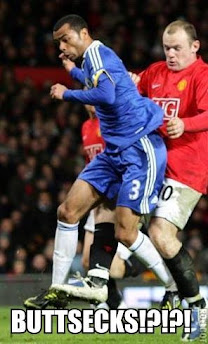
It’s a fact that I think everyone is kind of struggling to explain. Casting the net wider to include those involved in football behind the scenes at administrative and executive level, we find just as few black faces. The Voice, Britain’s leading newspaper for the black community, published last week their annual ‘Black List,’ which counted down the most influential Afro-Caribbean people in football in this country. The rundown featured a couple of senior administrators, such as Millwall's executive deputy chairman Heather Rabbatts, assistant chief executive of the PFA Bobby Barnes, and also finally, Jason Rockett at Sheffield United who is the only black chief executive currently in professional English football. Other notables included in this ‘Black List’ were a few obvious broadcasters, such as Chris Kamara and Garth Crooks, along with England women’s coach Hope Powell, up-and-coming sports agent Chris Nathaniel (clients include Micah Richards, Obafemi Martins and Ryan Babel) and the only current player on the list; this week’s England captain, Rio Ferdinand.

However, it seems that the shift from player to manager is the one that often black players seem reluctant to make. During, for example, Paul Ince’s career, there were perhaps not as many black stars as there are now, yet many successful and respected players still jump out…Ian Wright, John Barnes, Paul Parker, Michael Thomas, Robbie Earle…to name just a few. So while the likes of Roy Keane and Gareth Southgate strolled into top flight management upon ending their playing careers, why is it that retiring black footballers seem to bolt from the game and instead often head into the media? Speaking to BBC Sport this week ahead of his side’s FA Trophy Final at Wembley this weekend, Ince addressed the issue: “A lot of fantastic black footballers that have been in the game have all of a sudden disappeared and gone out of it. Maybe they feel they're not really cut out to be a manager, I don't know.” Like I said, it’s a fact that I’m at a loss to explain as well, because it isn’t even like the horrendous racial abuse of football’s yesteryear is still prevalent around the country.
With Ince building on his previous success with Macclesfield, many in the game believe it is only a matter of time before England’s first black captain becomes the Premier League’s first black British manager, but given that it’s taken more than 15 years to happen, there’s clearly something wrong somewhere. Don’t misunderstand this article as an accusation of inherent racism within the game or the creation of some kind of ethnic conspiracy though, it’s just fascinating how the fact of two black managers out of 92 can co-exist with a 20-man England squad this week which included 12 black players. Ince continued: “If I can be the yardstick then I've done something good. I hope I can say to people like (Andy) Cole, (Sol) Campbell and (Ledley) King that once they've finished playing football, why go out of it?”

Former England international and Spurs striker Les Ferdinand is keen to follow in Ince’s footsteps, but having taken his UEFA B coaching licence and a certificate in applied management at Warwick University, says that “the opportunities are not quite there for black managers at the moment.” He continued: “There seems to be the same thinking about black coaches as there was about black players in the 1970s. It used to be the case that a manager would look at a black player and think ‘he's quick, we'll play him up front or on the wing’... I think black coaches are being stereotyped in the same way at the moment. You see black people behind the scenes at football clubs, but not at the helm.”

You get the feeling that the tide might be about to turn though, with the FA under the microscope at the moment following the somewhat outspoken comment from Garth Crooks (current football adviser to the Commission for Racial Equality) that English football should be “ashamed of itself” because of the lack of black coaches. As ever though, the danger is of over-compensation and so-called ‘positive discrimination,’ a fact that Ferdinand is all too aware of: “I don't want a job because it's the politically correct thing to do. I want it because I'm the best person available.”

